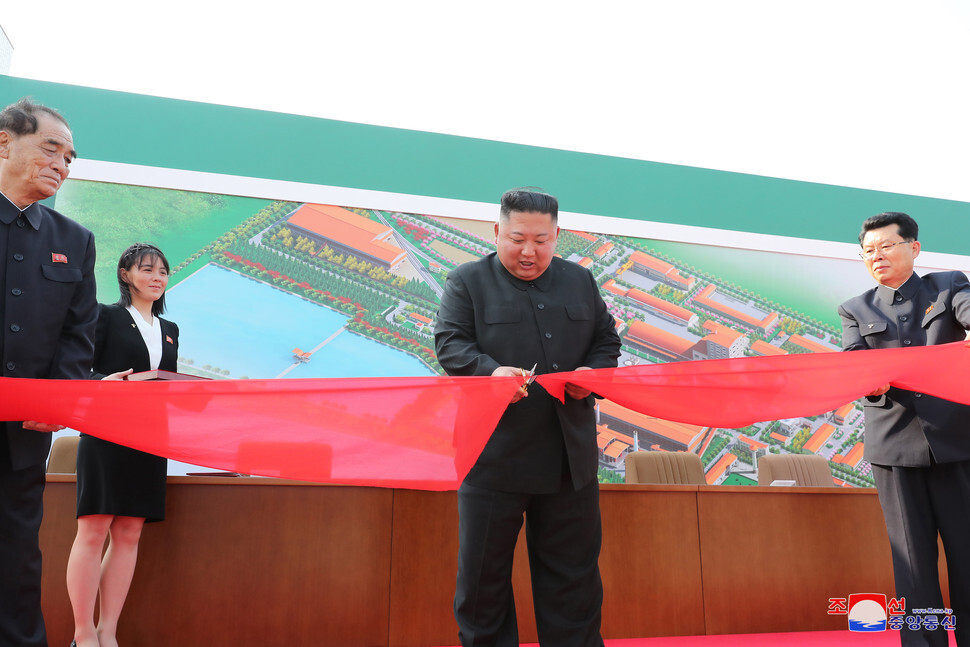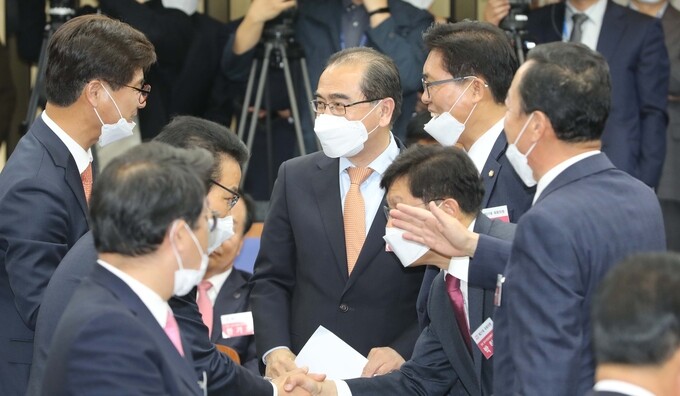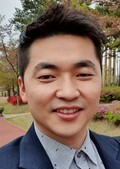hankyoreh
Links to other country sites 다른 나라 사이트 링크
[Column] A N. Korean defector’s words impact the lives of all defectors living in S. Korea

Two North Korean defectors were recently elected to South Korea’s 21st National Assembly. As a defector myself, I am gratified to see defectors becoming National Assembly members, regardless of their political affiliation, and I am sure this will be a great boon to defectors in general. At the same time, it’s also true that my feelings toward the two members who were elected have been a mixture of anticipation and trepidation. Before their terms even began, it has been the trepidation rather than the anticipation that has become a reality -- with consequences that fall squarely on South Korea’s 33,500 defectors, including me.
I had genuinely hoped they would do well. For them to become National Assembly members in South Korea despite carrying the “stigma” of being North Korean defectors was likely an official test showing on behalf of those 33,500 defectors that it truly is possible for us to proudly succeed as South Koreans.

The irregularity of Kim Jong-un’s absence from the public eye for 20 days gave rise to all sorts of stories, and the “confident analyses” of the two elected lawmakers -- Thae Yong-ho of the United Future Party and Ji Seong-ho of the Future Korea Party -- were decisive in creating further confusion among South Koreans. But it didn’t stop there: their irresponsible statements only served to breed greater distrust and hatred toward defectors, laying waste to the trust that those 33,500 people have been fighting so hard to build in South Korea.
The two newly elected National Assembly members soon found themselves branded as “Reds,” “spies,” “right-wing die-hards,” “thieves,” and “criminals.” Not only that, but the situation helped to cement the existing distrust among some South Koreans, showing them that “defectors just can’t be trusted.” The result has been to damage the image of defectors in general.
Life as a defector in South Korea is an endless battle for recognition and trust. You have to be more diligent than anyone, earning recognition for yourself as a true citizen of the Republic of Korea. The reality is that because of your status as a defector, the only way to win trust is to work harder than everyone else.
The power of “words” that comes with the identity is very great -- all the more so when you are a member of the National Assembly. It is nothing new for the personal stories we share to be overgeneralized into stories about North Korea as a whole simply because we arrived from the same place. Meanwhile, the endless outpouring of fake news and YouTube clips takes away the power to make rational judgments about the North.
Within South Korea, the impact of a single defector’s speech can be unexpectedly large. This is why so many questions have been raised and so many controversies have unfolded over the credibility of statements made by defectors. Indeed, I published a 2015 column on this very topic. (U Korea News, “How Should We View the Defector Credibility Issue?”)
The more media attention a defector receives, the more restrained and responsible he or she needs to be in words and actions. It’s unfortunate to see that the two lawmakers’ response after seeing Kim Jong-un cheerfully striding along, as if to mock the reports of his death, was not to apologize, but to carry on with their irresponsible attitude and insist that people “not jump to conclusions.” They would have done well not to jump to conclusions in the first place.
Rather than offering pathetic justifications of the analyses being “slightly off” or calling for us to avoid jumping to conclusions, they ought to be apologizing for the confusion they caused by speaking with such certainty when their intelligence was anything but. That’s the least they could do to take responsibility, and it would offer them a way of regaining trust over the next four years of their terms. Such an apology would also be a gesture to the defectors who are working so hard and living so diligently in South Korean society.
Thae did at least offer a belated apology on May 4. By then, the trust train had already left the station. An apology does not absolve you of any further responsibility. It remains entirely up to those two lawmakers how they are to restore the trust that has been lost. Hopefully, they will reflect deeply on the meaning of politically serving defectors as they go about their future activities in parliament. This can’t be allowed to result in a loss of trust for the defectors who are hoping this will be a source of strength for them “in spite of everything.”
As a defector myself, it is difficult for me to make these kinds of criticisms. But the reason for my criticisms is that I want politics that truly benefit defectors. Keeping in mind how many defectors are concerned that these same sorts of things may continue to happen with the two politicians over the next four years, I sincerely hope they will not sacrifice the trust defectors have placed in them.

By Cho Kyung-il, director of the United Korea Cooperative
Please direct comments or questions to [english@hani.co.kr]

Editorial・opinion
![[Column] Season 2 of special prosecutor probe may be coming to Korea soon [Column] Season 2 of special prosecutor probe may be coming to Korea soon](https://flexible.img.hani.co.kr/flexible/normal/500/300/imgdb/original/2024/0426/3317141030699447.jpg) [Column] Season 2 of special prosecutor probe may be coming to Korea soon
[Column] Season 2 of special prosecutor probe may be coming to Korea soon![[Column] Park Geun-hye déjà vu in Yoon Suk-yeol [Column] Park Geun-hye déjà vu in Yoon Suk-yeol](https://flexible.img.hani.co.kr/flexible/normal/500/300/imgdb/original/2024/0424/651713945113788.jpg) [Column] Park Geun-hye déjà vu in Yoon Suk-yeol
[Column] Park Geun-hye déjà vu in Yoon Suk-yeol- [Editorial] New weight of N. Korea’s nuclear threats makes dialogue all the more urgent
- [Guest essay] The real reason Korea’s new right wants to dub Rhee a founding father
- [Column] ‘Choson’: Is it time we start referring to N. Korea in its own terms?
- [Editorial] Japan’s rewriting of history with Korea has gone too far
- [Column] The president’s questionable capacity for dialogue
- [Column] Are chaebol firms just pizza pies for families to divvy up as they please?
- [Column] Has Korea, too, crossed the Rubicon on China?
- [Correspondent’s column] In Japan’s alliance with US, echoes of its past alliances with UK
Most viewed articles
- 1‘We must say no’: Seoul defense chief on Korean, USFK involvement in hypothetical Taiwan crisis
- 2After election rout, Yoon’s left with 3 choices for dealing with the opposition
- 3Why Kim Jong-un is scrapping the term ‘Day of the Sun’ and toning down fanfare for predecessors
- 4Noting shared ‘values,’ Korea hints at passport-free travel with Japan
- 5AI is catching up with humans at a ‘shocking’ rate
- 6[Editorial] Korea’s surprise Q1 growth requires objective assessment, not blind fanfare
- 7Two factors that’ll decide if Korea’s economy keeps on its upward trend
- 8Yoon says collective action by doctors ‘shakes foundations of liberty and rule of law’
- 9Amnesty notes ‘erosion’ of freedom of expression in Korea in annual human rights report
- 10South Korea a veritable tax break paradise for chaebol